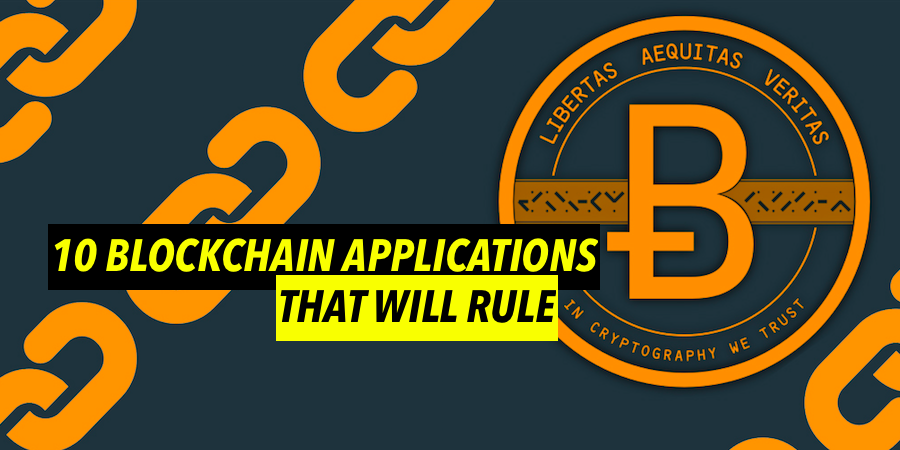One of the most discussed topics in tech industry today is blockchain technology. We are beginning to understand what a blockchain is, but how can we best use this technology within our business?
Technically, Blockchain is a distributed database, spread across many computers with no central control that could transform governance, the economy, businesses and the functioning of organisations.
And by the way, it’s already here, not only in Bitcoin, but in many other services and commodities – badges, credits, and qualifications.

These are the 10 Blockchain Applications that that will rule 2018 and beyond,
1. Smart Contracts
One of the most promising applications of blockchain technology is the smart contract. What if you could cut your mortgage rate, make it easier to update your will? The world of smart contracts is fast approaching, but what are they?
These are legally binding programmable digitized contracts entered on the blockchain. What developers do is to implement legal contracts as variables and statements that can release of funds using the bitcoin network as a ‘3rd party executor’, rather than trusting a single central authority.
For example, if two people want to exchange $100 at a specific time in future when a set of preconditions are met, the conditions, payout, and parties’ details would be programmed into a smart contract. Once the defined conditions are met, funds would be released and sent to the appropriate party as per terms.
2. Distributed cloud storage
Current cloud storage services are centralized — thus you the users must place trust in a single storage provider. “They” control all of your online assets.
On the other hand with the Blockchain, this can become decentralized. For instance, Storj is beta-testing cloud storage using a Blockchain-powered network to improve security and decrease dependency. Additionally, users (you) can rent out their excess storage capacity, Airbnb-style, creating new marketplaces.
Anyone on the internet can store your data at a pre-agreed price. Hashing and having the data in multiple locations are the keys to securing it.
3. Digital Identity
Imagine never having to worry about your digital security every again. It’s a massive problem in the world. Which is now estimated to cost the industry about $18.5 billion annually, according to a report released Thursday by Distil Networks.
That means for every $3 spent, $1 is going to ad fraud. Blockchain technologies make tracking and managing digital identities both secure and efficient, resulting in seamless sign-on and reduced fraud.
4. Healthcare
Blockchain technology has the potential to make health information exchanges (HIE) more secure, efficient, and interoperable.
Blockchain offers a new model for HIE, enabling disintermediation and allowing near real-time updates across the network for all parties. Blockchain-based systems can reduce or eliminate the friction and costs of current intermediaries.
5. Decentralized Notary
One interesting feature of the blockchain is its timestamp feature. The whole network essentially validates the state of wrapped piece of data (called a hash) at a certain particular time.
As a trustless decentralized network, it essentially confirms the existence of [something]at a stated time that is further provable in a court of law. Until now, only centralized notary services could serve this purpose.
6. Share Trading
Share trading will soon be impacted by the blockchain. Utilizing blockchain technology potentially allows for greater trade accuracy, and a shorter settlement process.
Buying and selling stocks and shares has always involved many middlemen, such as brokers and the stock exchange itself.
Creating a decentralized and secure ledger – a blockchain – that gives every party a say in the validation of a transaction, speeds up the settlement process, allows for greater trade accuracy, and can cut out some of the ‘middlemen’ (such as brokers) while changing the role of others (such as those determining share price).
7. Digital Voting
The greatest barrier to getting electoral processes online, according to its detractors, is security. Using the blockchain, a voter could check that her or his vote was successfully transmitted while remaining anonymous to the rest of the world. In 2014, Liberal Alliance, a political party in Denmark, became the first organization to use blockchain to vote.
8. Loyalty and Rewards
Blockchain offers many benefits, including transparency and traceability of transactions. This will help banks and insurers to create a more captivating loyalty and rewards program that fits 24/7 performance management and enhances engagement.
Talent has always been a boardroom issue, but with so many new technologies rapidly evolving, high performance is more crucial than ever. As a result, performance management has gained impact as well, as a tool to improve retention.
9. Travel And Hospitality
For travel and hospitality, a shared distributed ledger can simplify the settlement process. Blockchain technology can support loyalty points programs that include a more advantageous accounting of liabilities created by the accrual of points, real-time updating of points balances, and improved points management across franchised operations.
10. Artist Centric
In the creative economy, blockchain can redefine how artists are remunerated by acting as a platform for creators of intellectual property to receive value for their work.
Blockchains can host “smart contracts” to help artists manage digital rights and allocate revenue shares to contributors to the creative process. Such smart contracts have the potential to replace conventional contracts, which can be esoteric and leave some artists with little power over the terms for the content they generate.
All of the transactions for a creative work could be seen and validated, including who accessed the work and how much revenue the work is generating at any point in time. By tracking the demand for creative content, pricing could be more dynamic. Prices for creative content could fluctuate according to supply and demand.

